Be the first to know!
Join our list to be notified of new buildings and other discounts.
(*You can unsubscribe at any time.)
Join our list to be notified of new buildings and other discounts.
(*You can unsubscribe at any time.)
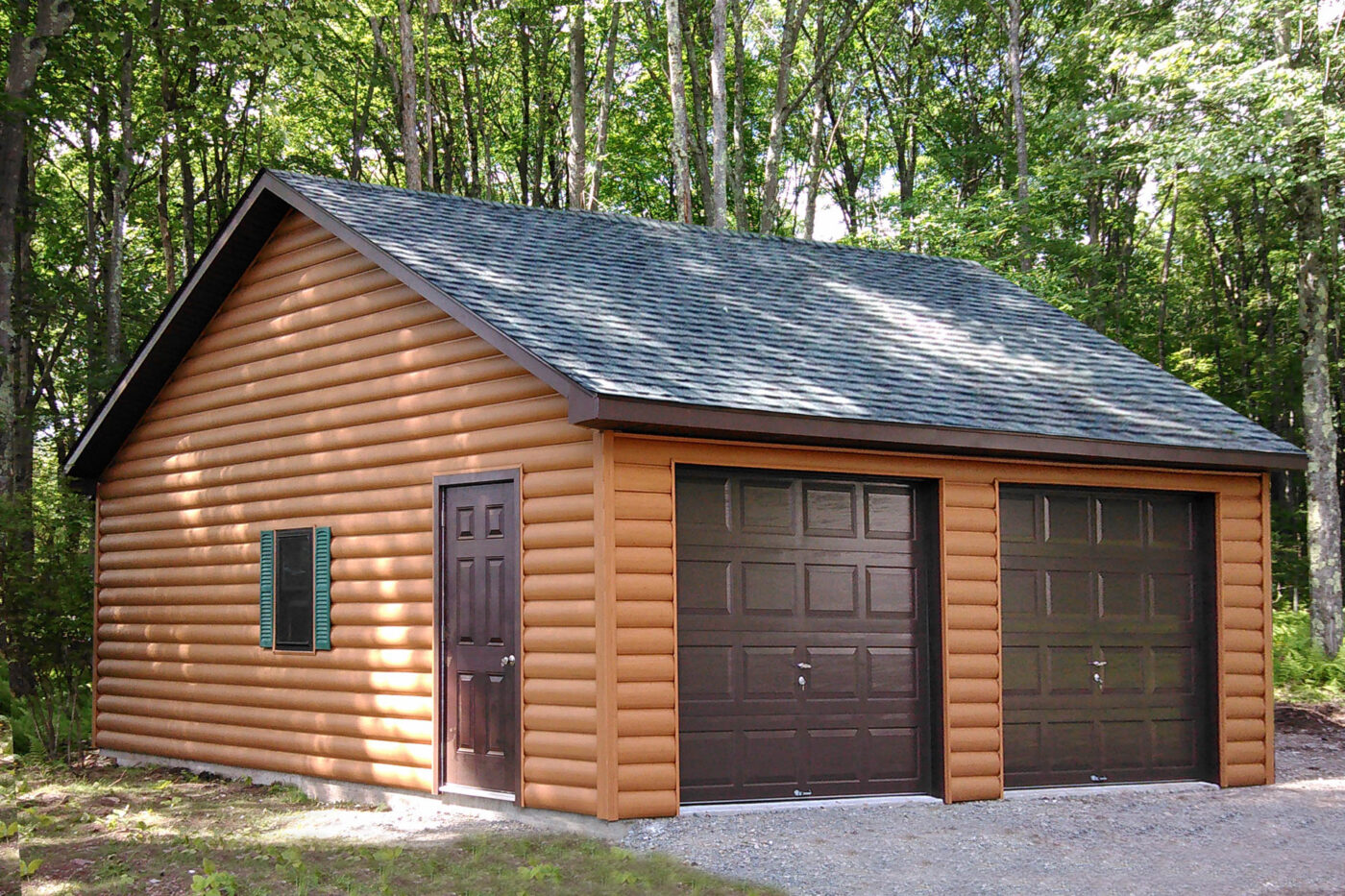
Constructing a garage in Massachusetts requires careful attention to local zoning laws, building codes, and permitting procedures to ensure the project meets both state and municipal regulations. Whether you’re adding a simple structure or a more complex garage, navigating the permit process is essential for a successful construction.
Below is a detailed guide to help you understand the various steps involved in obtaining the necessary permits for your garage project in Massachusetts. In the meantime, if you’d like to explore the garage models we offer or design your own with our 3D Builder, feel free to visit our Garage Page or 3D Building Page.
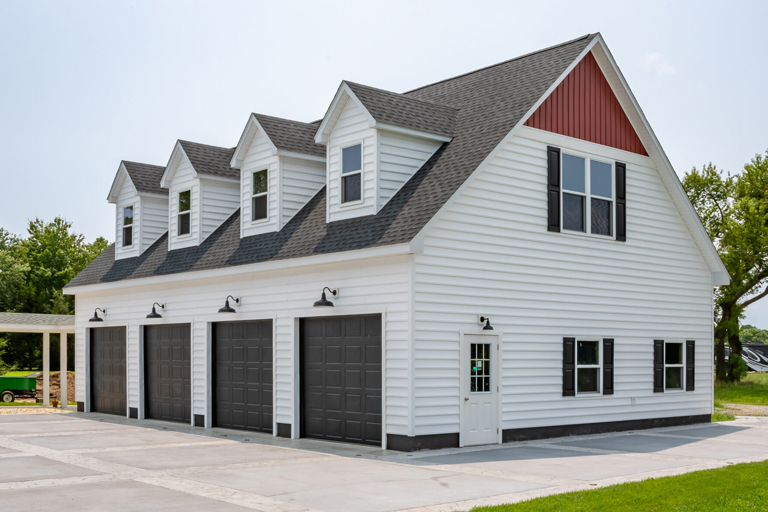
In Massachusetts, if you’re planning to add a garage shed to your property, you’ll need to obtain a permit and follow the necessary steps to ensure everything is done correctly.
There may be exceptions to the permit requirement if the garage is smaller than 200 square feet. However, we recommend double-checking with your local zoning codes and state regulations to ensure you’re in compliance.

Garages under 200 square feet in size generally do not require a building permit in Massachusetts.
However, this can change depending on where you live, so it’s important to check with your local government office. Even if a permit isn’t required, there may still be other rules to follow, like how close the garage can be to your property lines.

Yes, if you plan to run electricity to your garage in Massachusetts, you will need an electrical permit. This is required whether you’re installing basic lighting or running outlets for tools and equipment.
If you’re planning to install electrical wiring in your garage, you will likely need a separate electrical permit, regardless of the garage’s size. This requirement helps ensure that all electrical work complies with safety standards and building codes. To get started, reach out to your local building department for detailed guidance on obtaining the necessary permit and arranging inspections to verify compliance.

Each county in Massachusetts may have its own set of regulations for garages, including specific zoning laws and permit requirements. Generally, a garge permit will be required if the garage is above the threshold size or if it’s located within a designated area like a historic district or conservation zone.
For example:
Barnstable County may have stricter regulations due to its coastal and historical significance.
Middlesex County may have more relaxed restrictions in rural areas but could be stricter in densely populated towns like Cambridge.
Let’s take a closer look at what each county requires for garage permits.
| Counties | Websites |
|---|---|
| Barnstable County | Department of Building Permits |
| Berkshire County | Follow State Regulations |
| Bristol County | Follow State Regulations |
| Dukes County | Department of Permits |
| Essex County | Department of Building Inspector |
| Franklin County | Department of Inspections-Permits |
| Hampshire County | Department of Building Permits |
| Hampden County | Department of Building Permits |
| Middlesex County | Follow State Regulations |
| Nantucket County | Department of Building Permits |
| Norfolk County | Department of Building Permits |
| Plymouth County | Department of Properties-Permits |
| Suffolk County | Follow State Regulations The Massachusetts State Building Code |
| Worcester County | Department of Building Permits |
Garages under 200 square feet in Barnstable County typically only require registration instead of a full building permit.
However, if your garage is over 200 square feet, you’ll need to obtain a building permit. Since each town may have its own specific regulations, it’s important to contact the local building department to confirm the requirements and the application process.
If you’re planning to get a garage shed and live in Berkshire County, you’ll likely need a building permit if the structure is larger than 200 square feet.
Even for garages under 200 square feet, a permit or zoning approval may still be required, depending on your town’s specific regulations. To be sure you’re following the rules, it’s best to check with your local building department for the exact requirements and approval process.
If you’re planning to build a garage in Bristol County, MA, you’ll likely need a building permit—especially for structures over 200 square feet.
Some towns may also require zoning approval. To avoid any delays or penalties, it’s best to check with your local building department and make sure you’re fully informed before getting started.
In Dukes County, Massachusetts, building permit requirements for garages can vary by town.
For instance, in West Tisbury, any garage over 200 square feet requires a building permit and must adhere to specific setback regulations. Similarly, other towns in Dukes County may have their own regulations regarding garage construction. Therefore, it’s essential to consult your local building department to determine the exact requirements and ensure compliance with local codes and zoning laws.
Yes, in Essex County, MA, a building permit is required if you’re planning to construct, alter, repair, or demolish a structure.
Requirements can vary by municipality. For example, Essex and Salem both use online permit systems. It’s important to check with your local building department for specific requirements and to ensure compliance with local codes and zoning laws.
In Franklin County, MA, you’ll typically need a building permit to construct a garage. Permit requirements can vary depending on the town, but generally, any new structure, including garages, requires approval.
For instance, Greenfield requires a permit for detached structures like garages over 200 square feet. To make sure you’re following the right process and meeting local codes, it’s a good idea to contact your town’s building department before you start.
In Hampshire County, MA, a building permit is usually required to construct a garage. This applies whether you’re building a new garage or making significant changes to an existing one. However, permit requirements can vary depending on the town.
In Hampden County, MA, a building permit is generally required to construct a garage. This is in accordance with the Massachusetts State Building Code, which mandates permits for new construction, alterations, or significant repairs to structures, including garages.
In Middlesex County, MA, you must follow the state building codes. If you’re planning to build a garage larger than 200 square feet, you’ll need to obtain a building permit.
However, In Middlesex County, permit requirements vary by town. Burlington requires contractor details and a site plan for building permits, while Bedford needs a plot plan and permit for garages under 200 sq ft, with additional plans required for larger structures.
In Nantucket County, Massachusetts, constructing a garage generally requires obtaining a building permit.
The Town of Nantucket’s official website provides comprehensive information on various permits, including building permits, accessible through their Citizen Self Service Portal.
Yes, a permit is generally required to build a garage in Norfolk County, MA, whether it’s attached to your home or detached.
The specific requirements can vary depending on the town or city within the county. Typically, you’ll need a building permit for construction, and if your garage is over 200 square feet, you may also need zoning approval.
In most counties in Massachusetts, including Plymouth, you’ll need a permit if you’re planning to build a garage.
However, specific requirements vary by town. For example, Plymouth requires a permit for garages larger than 200 square feet, while towns like Carver and Pembroke may have additional zoning and setback requirements. It’s essential to check with your local building department to confirm the exact permits and approvals needed for your project.
In Suffolk County, MA, a building permit is generally required for constructing a garage, but the specific requirements depend on the municipality.
In Boston, permits are handled by the Inspectional Services Department, with online applications available. In Braintree, a permit is required for any garage, with setbacks of 5 feet on the sides and rear, 20 feet from the street, and no placement in the front yard.
In Worcester County, MA, a building permit is typically required for constructing a garage, whether it’s attached or detached.
Since each town within Worcester County may have its own local zoning laws and building codes, it’s important to check with your local building department for the exact requirements and permit process.

In Massachusetts, constructing a garage typically requires a permit, but the specific requirements can vary widely between cities and towns.
While the Massachusetts State Building Code offers general guidelines, local regulations may include additional restrictions or requirements. Below are the top 10 cities in Massachusetts, along with helpful links to their building department websites, where you can find detailed information about permit requirements for building projects, including garages.
| Cities | Websites |
|---|---|
| Boston | Department of Building Permits |
| Worcester | Department of Building Permits |
| Springfield | Department of Building Permits |
| Cambridge | Department of Building Permits |
| Lowell | Department of Building Permits |
| Brockton | Department of Building Permits |
| Quincy | Department of Building Permits |
| Lynn | Department of Building Permits |
| New Bedford | Department of Building Permits |
| Fall River | Department of Building Permits |
In Boston, constructing a garage generally requires obtaining a building permit from the Inspectional Services Department (ISD). The process and requirements can vary depending on the scope and nature of your project.
In Worcester, Massachusetts, constructing a garage typically requires obtaining a building permit. This is mandated by the Massachusetts State Building Code, which stipulates that any new construction, including accessory structures like garages, must have a permit
In Springfield, MA, constructing a garage requires obtaining a building permit from the Department of Code Enforcement. The process includes submitting a completed application form, three sets of detailed building plans, and a plot plan showing property boundaries and required setbacks
In Cambridge, Massachusetts, a building permit is required for constructing a garage. The permit must be obtained from the Inspectional Services Department (ISD) before beginning any work, and it should be displayed at the job site.
Constructing a detached garage in Lowell, Massachusetts requires obtaining a building permit from the City’s Development Services Office. Detached garages must adhere to specific location and size regulations:
If you’re planning to build a garage in Brockton, you’ll need a permit from the Building Department. You can easily apply online, by mail, or in person. Just be sure to have your project details and the fee ready.
To build a garage in Quincy, MA, you’ll need a permit from the Inspectional Services Department. You can easily apply online through their ViewPoint Cloud portal, or if you prefer in-person assistance, stop by their weekly help clinic on Thursdays from 2:00 PM to 4:00 PM at the DPW Complex on Sea Street.
Planning to build a garage in Lynn, MA? You’ll need a permit from the Inspectional Services Department (ISD). You can easily apply online through the Lynn ISD portal, or if you prefer face-to-face assistance, stop by City Hall (Room 401) where staff are available to help.
To build a garage in New Bedford, MA, you’ll need a permit from the Inspectional Services Department (ISD). You can apply online through the New Bedford Online Permit Center or visit the ISD office at 133 William Street (Room 308) for in-person assistance. The fee is $0.18 per square foot, with a minimum of $75.
In Fall River, Massachusetts, constructing a garage typically requires obtaining a building permit to ensure compliance with the Massachusetts State Building Code and the city’s Zoning By-Laws. Building permits are necessary for new constructions, additions, and certain structural changes.

You can obtain a garage permit at your local city or town hall.
Most Massachusetts municipalities have a building department or zoning office that handles permit applications for residential structures, including sheds and garages. Applications may be available online, or you can visit the office in person to submit the necessary paperwork. Some towns may also have online permitting systems to streamline the process.

The cost of a garage permit in Massachusetts can vary depending on where you are and the size of the garage.
Typically, building permits range from $50 to $200. If you’re adding electricity to your garage, an electrical permit could cost an extra $50 to $100, depending on how complex the wiring is. Be sure to check with your local office to get the most accurate fee details for your specific project.

The processing time for a building permit in Massachusetts can vary based on the town or city, the complexity of the project, and the volume of permit applications being processed. On average, it may take two to six weeks to receive a permit. In more densely populated areas, or if you are applying for permits during peak building seasons, it could take longer.
It is always a good idea to submit your permit application well in advance of the planned construction start date.
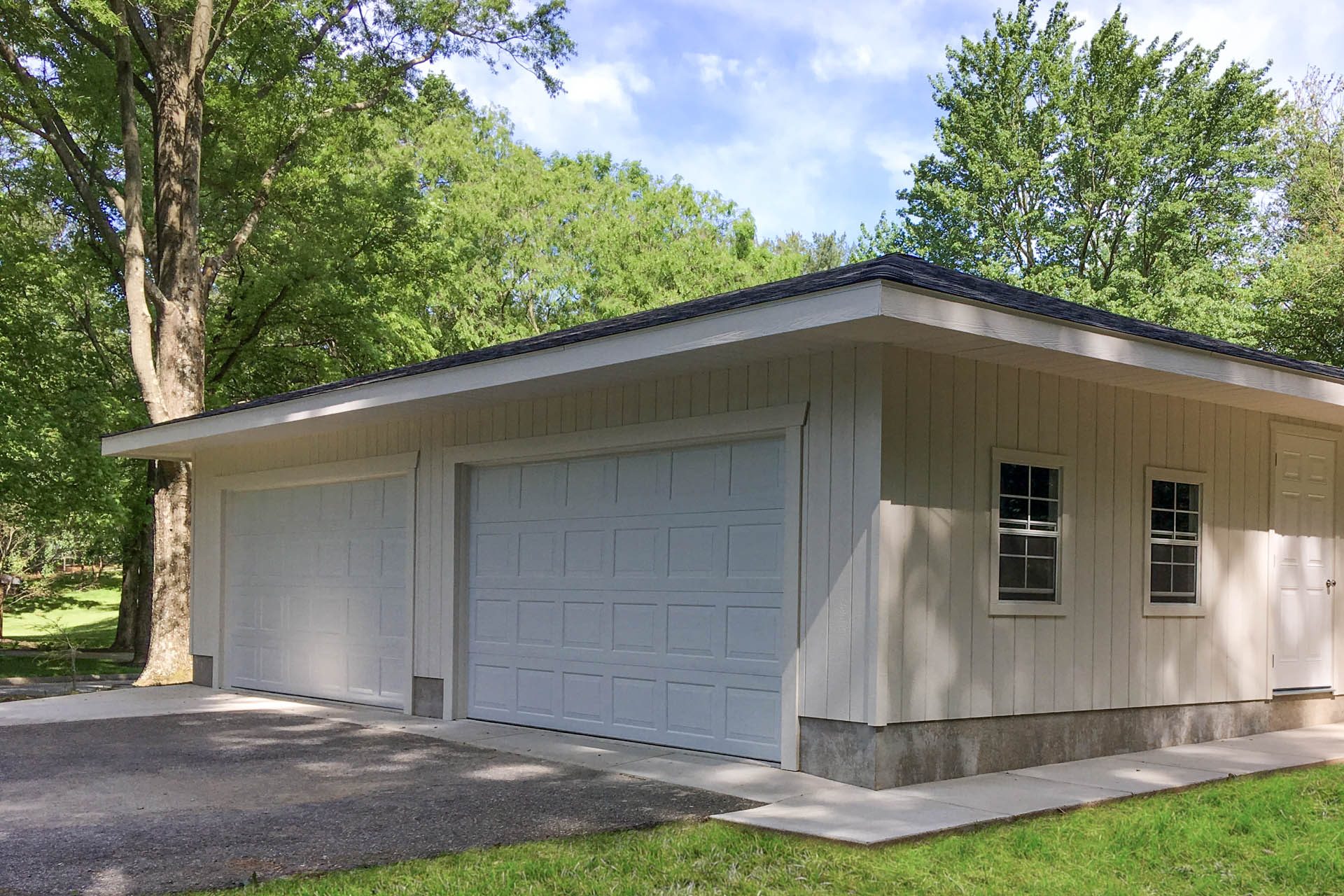
In Massachusetts, a building permit typically expires after one year if construction has not begun.
However, the duration can vary by locality, and extensions may be granted if necessary. If your project is not completed within the approved timeframe, you may need to reapply for a new permit.
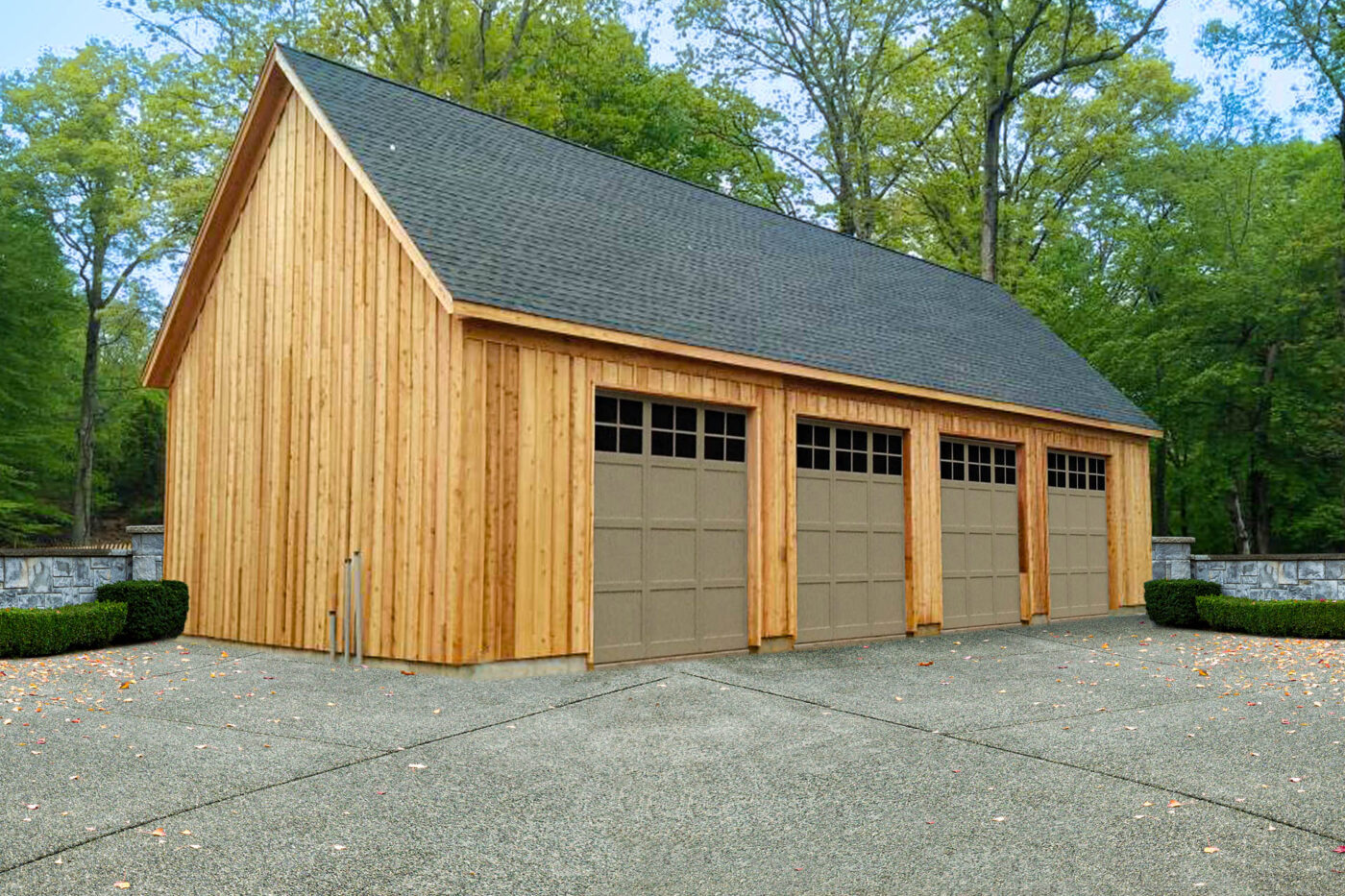
Failing to obtain a required permit for a shed or garage in Massachusetts can result in significant penalties. The penalties may include fines, orders to remove the structure, or legal action for non-compliance. Fines can range from $50 to $1,000 per day until the violation is corrected.
In some cases, you may be required to demolish the unpermitted garage and remove all construction materials at your own expense.

Here’s a list of what you may need to apply for a garage permit in Massachusetts:
Be sure to check with your local building department for any specific requirements for your area!
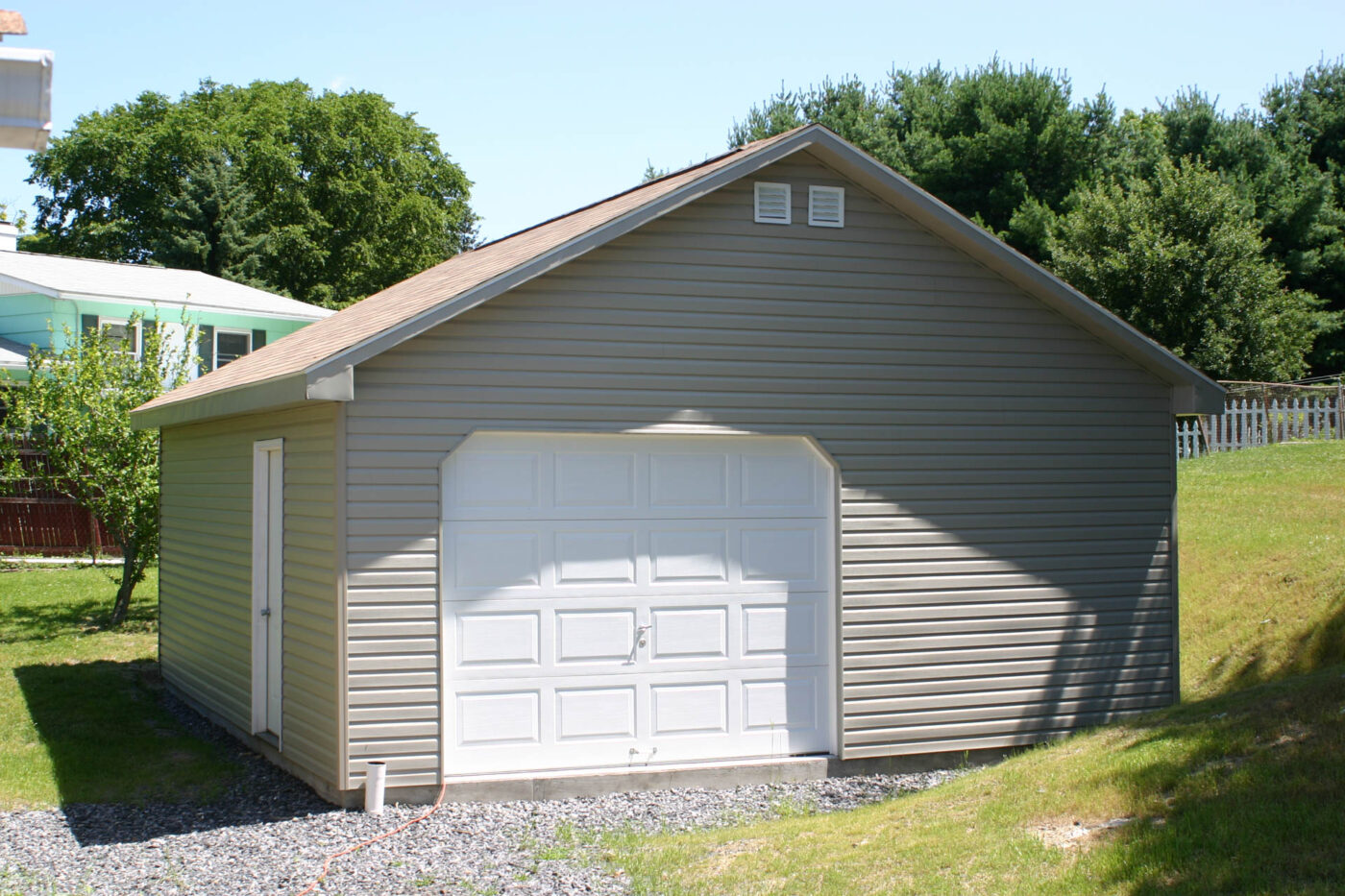
Building a garage or installing a garage in Massachusetts requires careful attention to local regulations and permitting processes. While a permit may not always be necessary for smaller structures, it’s always best to check with your local zoning office to avoid penalties. If you plan to install electricity, make sure to obtain the proper electrical permit, and keep track of the permit’s expiration to ensure compliance. Following the rules not only keeps you within the law but also ensures the safety and integrity of your property.
Always consult with your local town or city hall to confirm the specific permit requirements and fees applicable to your construction project.
Don’t forget, if you’re ready to explore your garage options, our 3D Garage Builder and model pages are always here to help!
Create the building of your dreams by customizing a design in 3D. You can also call us at 717-442-3281. We're here to assist you!